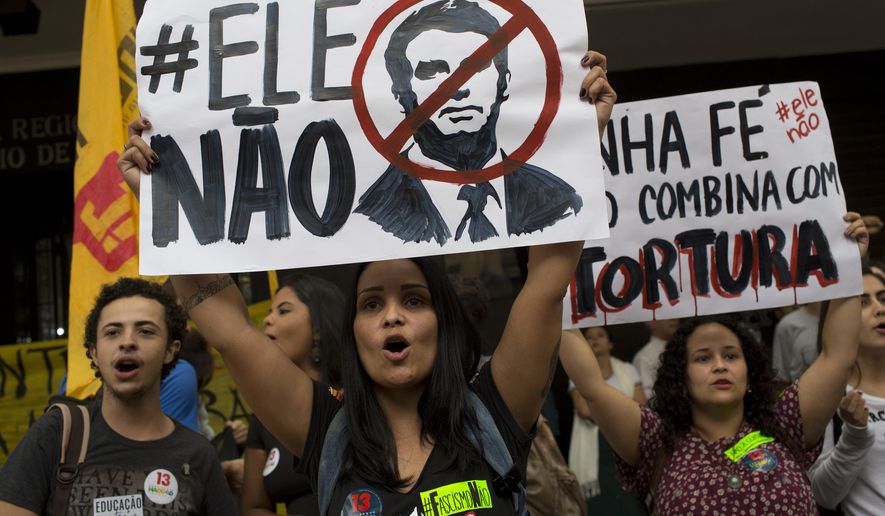RIO DE JANEIRO (AP) - Two days before Brazil picks its next president, thousands gathered in front of Rio de Janeiro’s electoral court on Friday to protest its ruling forcing universities to remove banners containing allegedly illegal electoral propaganda.
Electoral courts in six other states made similar moves, which led several top Brazilian judges to criticize the decisions as a blow to freedom of speech.
Witnesses say most of the material seized by authorities was either critical of front-runner Jair Bolsonaro and his supporters - although few mentioned the far-right candidate by name - or suggested he was a fascist. The former army captain denies he is a radical, but does praise Brazil’s 1964-1985 military dictatorship.
Students and professors accused the Rio court of exercising censorship and working in favor of Bolsonaro, who leads all polls before Sunday’s runoff.
“The court supports dictatorship,” several demonstrators chanted.
Rosa Maria Weber, who heads Brazil’s top electoral court, said there were “possible excesses” in the raids of at universities. Brazil’s Attorney-General Raquel Dodge opened an investigation into what she called exaggerations.
Earlier, the Rio chapter of the Brazilian Bar Association said in a statement that the court’s decision was an attempt to limit the freedom of expression of students and professors at the law school of the Fluminense Federal University.
“We repudiate the recent decision by the electoral court that censors the freedom of expression of students and professors at the law school who have the constitutional right to manifest themselves politically,” the statement said.
Bolsonaro’s name was not on a banner that read “Law Students Against Fascism,” but it was taken down earlier this week. Students quickly replaced it with one that said “Censored.”
At Rio de Janeiro’s State University a banner honoring murdered human rights activist Marielle Franco was also taken down.
Franco and her driver, Anderson Pedro Gomes, were killed in April while returning from an event focused on empowering young black women.
Also on Friday, Brazil’s federal police asked WhatsApp which numbers and phones spread content massively during the election. Daily Folha de S.Paulo reported earlier this week that companies illegally financed anti-Haddad ads via WhatsApp by Bolsonaro’s request.
Bolsonaro denied any wrongdoing. He claimed he cannot control how his supporters behave.
Brazil’s top electoral court opened an investigation on the case.
___
AP writers Savarese and Stan Lehman reported from Sao Paulo.




Please read our comment policy before commenting.